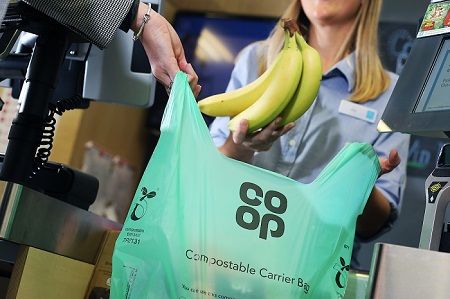The Co-op has announced its plans to roll-out single use compostable carrier bags to almost 1,400 of its food stores.
The retailer explained that after the bags are used to carry shopping, they can then be reused as food waste caddy liners.
They will initially be rolled out in towns, cities and villages where the bags are accepted in food waste collections, the retailer said. The Co-op also said it will be speaking with the remaining local councils to seek to extend coverage to more stores.
The move is part of a new strategy to be launched later this week by Co-op, with an aim to tackle plastic pollution as well as food waste.
AD
However, compostable liners used as food liners often end up being sent for energy from waste (EfW) rather than actually being composted. Recently, some in the anaerobic digestion (AD) sector have allowed food waste to be collected in plastics bags as opposed to compostable liners. And, some stores in the retail sector are moving away from the idea of single use bags.
Speaking to letsrecycle.com earlier this summer, Harry Waters of food recycler Agrivert explained that bioliners can become “gloopy” and difficult to separate during the AD process. Both bioliners and plastic bags are removed from the system and sent to EfW, he revealed.
And, in July Olleco explained that its Westcott Park AD facility can accept “limited amounts of plastic or compostable/biodegradable liners”.
Last year, resources charity WRAP published guidance on food waste caddy liners (see letsrecycle.com story). And, Mike Falconer Hall, programme area manager for organics at WRAP, shed light on the issue of food waste liners.
“There are a number of possible end destinations for PE and compostable liners once they’ve been removed from the food waste at AD,” he explained. “If the compostable liners can be segregated from other packaging they can be sent to in vessel composting and turned into compost. If PE liners can be separated from other packaging they can be washed and recycled.
“However, currently the most likely destination for PE and compostable liners is either energy from waste or landfill.”
And, according to WRAP, its research undertaken with AD operators suggested that PE liners were the most favoured option at the current time (see letsrecycle.com story), primarily due to the fact that they are easily removed at both the front end, and where required, from the back end of the processing system.
The new bags will substitute approximately 60 million standard plastic single-use ones; they are of the same size and strength and are the same price, at 5p/bag, Co-op said.
REA
Welcoming the announcement from the Co-op, Jeremy Jacobs, technical director of the Renewable Energy Association (REA), said: “Rolling out the compostable carriers in areas where they are accepted in food waste collections together with ensuring they are home compostable and making them the same size, strength and price as standard plastic single-use carriers makes it easy for consumers in these areas to switch.
“Crucially for the organics recycling sector, it should reduce the amount of plastic bags that arrive at composting facilities in these areas.”
Jeremy Jacobs
REA
“Crucially for the organics recycling sector, it should reduce the amount of plastic bags that arrive at composting facilities in these areas.”
The REA estimates that the UK organics recycling sector incurs an annual cost of £7.26 million for removing approximately 78,000 tonnes of plastic and sending it, mainly, to EfW facilities.
Mr Jacobs continued: “The Co-op’s encouragement of re-use of the compostable carriers before home composting or using them as kitchen caddie or food bin liners is a simple step that encourages resource efficiency and should help consumers in targeted areas to understand that the only carriers and liners allowed in their food waste bin are compostable ones.”
Packaging
According to Co-op, its strategy will set out how the retailer will ban single-use own-brand plastic products and reduce its overall use of plastic packaging within five years and stop using hard to recycle materials.
The Co-op’s pledge on plastic will see all its own-brand packaging become “easy to recycle by 2023” and to use a minimum of 50% recycled plastic in bottles, pots, trays and punnets by 2021.
The post Co-op to roll-out compostable carrier bags appeared first on letsrecycle.com.
Source: letsrecycle.com Plastic




